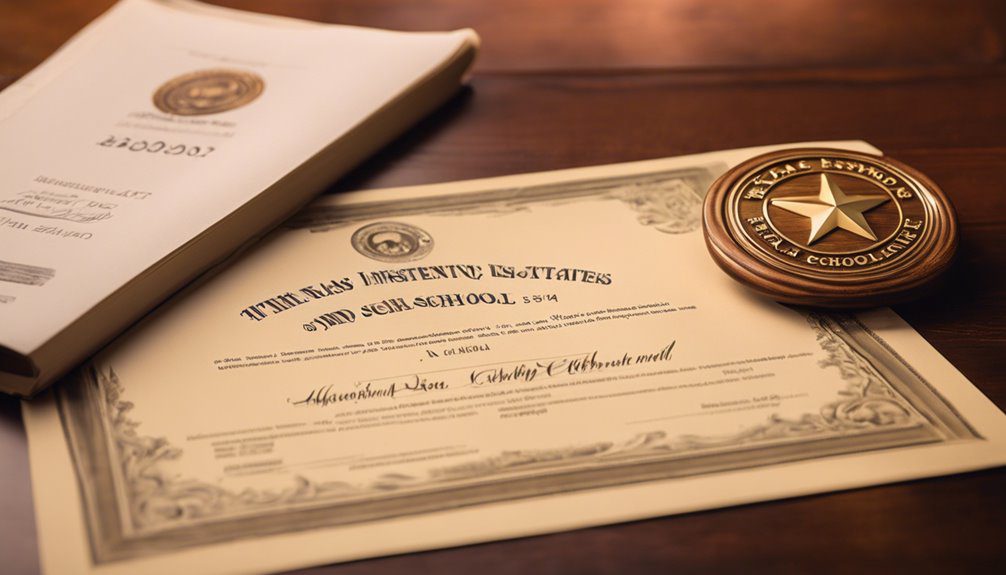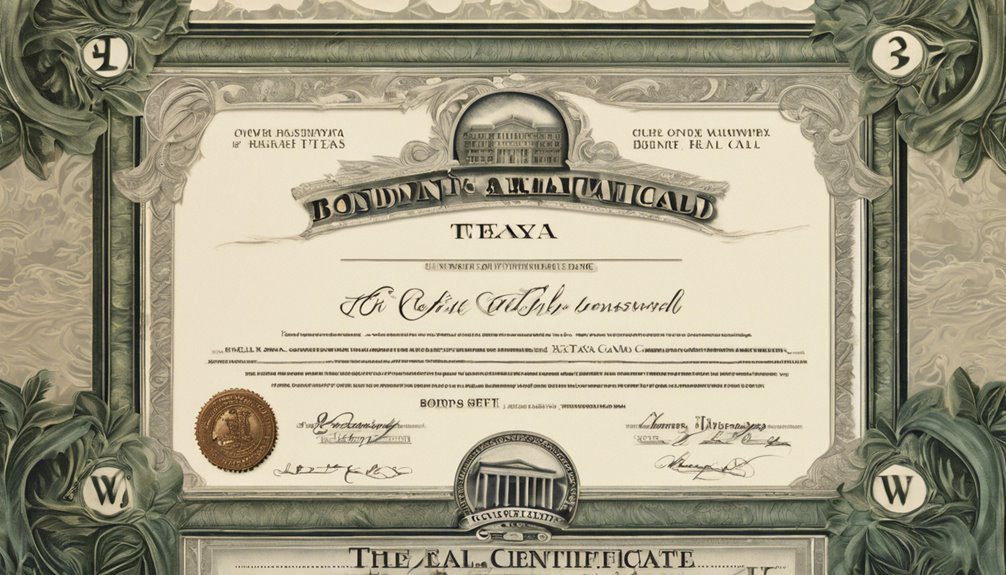When you consider enrolling in a Texas real estate school, understanding the Texas Real Estate School Bond is essential. This bond not only safeguards your investment but also ensures that the school adheres to state standards. You might wonder how this bond impacts the quality of education you receive, or what happens if a school fails to meet these expectations. As you think about your options, it's worth exploring the specific benefits and protections this bond offers, along with the implications for your future in real estate.
What Is a School Bond?

A school bond, in essence, is a type of financial tool that allows educational institutions to raise funds for various projects, such as building new facilities or renovating existing ones.
When a school district issues a bond, it's essentially borrowing money from investors, promising to pay back the principal plus interest over a set period.
You might wonder how this process works. The district develops a plan outlining the projects it needs funding for and then presents this plan to the community.
If voters approve the bond measure, the district can issue bonds to finance the projects. This means that you, as a taxpayer, may see an increase in your property taxes to help pay off the bond over time.
School bonds are crucial for maintaining and enhancing educational environments. They enable districts to provide better facilities, which can improve student learning experiences.
Moreover, these bonds often come with a lower interest rate compared to other financing options, making them an attractive choice for funding large-scale projects.
In short, school bonds play a vital role in supporting the educational infrastructure within your community.
Importance of the Texas Bond
Understanding the importance of the Texas bond is essential for anyone involved in the state's educational system. This bond acts as a safety net, ensuring that real estate schools operate with integrity and professionalism.
When you choose to attend a Texas real estate school, you deserve the peace of mind that comes from knowing the institution is financially responsible and compliant with state regulations.
The bond protects students like you from potential losses due to school misconduct, such as mismanagement of funds or failure to provide the promised education. If a school fails to meet its obligations, you can file a claim against the bond, which can help recover your tuition or other costs. This security is crucial for maintaining trust and accountability in the educational landscape.
Moreover, the Texas bond promotes a higher standard of education, encouraging schools to invest in quality instructors and resources. When schools are held accountable through bonding, they're more likely to prioritize your learning experience.
Eligibility Requirements for Schools

To qualify for a Texas real estate school bond, institutions must meet specific eligibility requirements set by the state. First, your school needs to be licensed by the Texas Real Estate Commission (TREC). This ensures that your institution adheres to the standards and regulations established for real estate education in Texas.
Next, you'll need to demonstrate a minimum level of financial stability. This usually involves providing documentation of your school's financial health, such as balance sheets or income statements. The state wants to ensure that you can operate effectively and fulfill your obligations to students.
Additionally, your curriculum must align with TREC's guidelines, covering essential topics like real estate principles, law, and finance. Compliance with these educational standards is crucial for bond eligibility.
Lastly, you may need to provide proof of qualified instructors who possess the necessary experience and credentials to teach the courses. Meeting these requirements not only secures your bond but also enhances your school's credibility in the competitive real estate market.
Benefits for Students
Students benefit greatly from attending a Texas real estate school that meets the rigorous standards set by the state. First and foremost, these accredited schools provide high-quality education that equips you with essential knowledge and skills for a successful real estate career.
You'll learn about property transactions, market analysis, and state regulations, all of which are crucial for passing the licensing exam.
Additionally, attending a recognized school gives you access to experienced instructors who bring real-world insights into the classroom. Their guidance can help you navigate the complexities of the real estate industry more effectively.
You'll also find networking opportunities with fellow students and industry professionals, which can lead to valuable connections and job prospects after graduation.
Moreover, many accredited schools offer flexible scheduling options, including online courses, making it easier for you to balance your studies with work or personal commitments.
Lastly, knowing that your school is bonded provides you with peace of mind, as it ensures financial protection and accountability.
How the Bond Works

The Texas real estate school bond serves as a safety net for students, ensuring that their investment in education is protected. This bond is a financial guarantee, typically required by the state, that schools must maintain to operate legally.
When you enroll in a real estate school, this bond assures you that if the institution fails to meet its obligations—like providing a quality education or fulfilling its promises—you can seek compensation.
When a school holds a bond, it must adhere to strict regulations and standards. If it fails to do so, you can file a claim against the bond. This process is straightforward: you'll need to present evidence of your complaint, such as documentation of unmet educational requirements.
If your claim is validated, the bond will cover your losses, providing you with financial relief.
In essence, the bond works as a protective measure, safeguarding your tuition and other related expenses. It promotes accountability among schools, ensuring they deliver on their promises. Additionally, the bond acts as a form of financial protection for students against potential malpractice by educational institutions.
As a student, knowing that this bond exists gives you peace of mind, allowing you to focus on your education without worrying about potential financial setbacks.
Consequences of Non-Compliance
Failing to comply with the regulations tied to the Texas real estate school bond can lead to serious repercussions for educational institutions.
For starters, you might face hefty fines, which can strain your budget and divert funds from essential programs. Additionally, non-compliance can result in the suspension or revocation of your institution's license, preventing you from operating legally. This not only disrupts your educational offerings but also damages your reputation in the community.
You could also face legal action from students or regulatory bodies if they believe they've been harmed by your non-compliance. This can lead to costly lawsuits and settlements, further impacting your financial stability.
Moreover, your ability to attract new students may suffer, as prospective learners often seek institutions with solid reputations and compliance records.
In the competitive landscape of real estate education, being non-compliant could mean losing your edge over other schools.
Ultimately, not adhering to the Texas real estate school bond regulations can create a ripple effect that jeopardizes your institution's future, making it crucial to stay informed and compliant with all requirements.
Steps to Obtain a Bond

Obtaining a Texas real estate school bond involves a series of clear steps that ensure compliance and protection for your institution.
First, you'll need to determine the required bond amount, which typically depends on your school's specifics and local regulations. Next, gather all necessary documentation, including your school's license information and financial statements.
Once you have your documents in hand, it's time to reach out to a reliable surety bond company. Compare quotes and terms from different providers to find the best fit for your needs.
After selecting a company, fill out the application form, providing accurate information about your school and its operations.
Following your application submission, the surety company will conduct a background check and assess your financial stability. If everything checks out, you'll receive a bond quote. Review the terms carefully before signing.
Upon payment of the premium, your bond will be issued, and you'll be officially compliant. Additionally, be aware that the Texas Health Spa Bond requires specific amounts depending on the nature of the services provided.
Lastly, keep a copy of your bond on file and ensure you renew it as necessary to maintain your standing. By following these steps, you'll secure the bond needed to operate your Texas real estate school successfully.
Choosing a Real Estate School
When it comes to choosing a real estate school, you'll want to consider several key factors to ensure you receive quality education. Start by researching the school's accreditation and reputation. A well-established institution with positive reviews can make a big difference in your learning experience.
Check the school's curriculum to ensure it covers all the necessary topics you'll need for your license exam.
Next, look into the instructors' qualifications. Experienced, knowledgeable instructors can provide valuable insights and real-world examples that enhance your understanding.
Additionally, consider the flexibility of the course format. Whether you prefer in-person classes or online learning, choose a school that fits your schedule and learning style.
Don't forget to compare costs. While you shouldn't compromise on quality, it's essential to find a program that fits your budget.
Frequently Asked Questions

As you dive into the world of real estate education, you might've questions about the process, requirements, and what to expect. One common question is, "What's the purpose of a Texas real estate school bond?" This bond protects students if the school fails to deliver the promised education or closes unexpectedly.
You may also wonder, "How much does the bond cost?" The bond amount can vary, but it typically ranges from $10,000 to $100,000, depending on the school's enrollment.
Another frequent question is, "Do I need to purchase a bond myself?" Generally, the school holds the bond, so you won't need to worry about obtaining it.
If you're asking, "How long is the program?" most real estate courses can be completed in a few weeks to several months, depending on your pace and the school's schedule.
Lastly, you might be curious about job placement assistance. Many schools offer resources to help you find a job after graduation, so be sure to ask about that. Additionally, understanding the importance of License and Permit Bonds can help you navigate the regulatory landscape as you pursue your real estate career.
These FAQs should help clarify your path as you embark on your real estate education journey.
Conclusion
In conclusion, the Texas Real Estate School Bond plays a vital role in protecting your investment in real estate education. By ensuring schools meet state standards, this bond fosters accountability and trust, giving you peace of mind. When choosing a real estate school, consider how the bond enhances their credibility and operational legitimacy. Remember, a school backed by a bond is more likely to provide the quality education you deserve, ultimately paving the way for your success in the industry.

